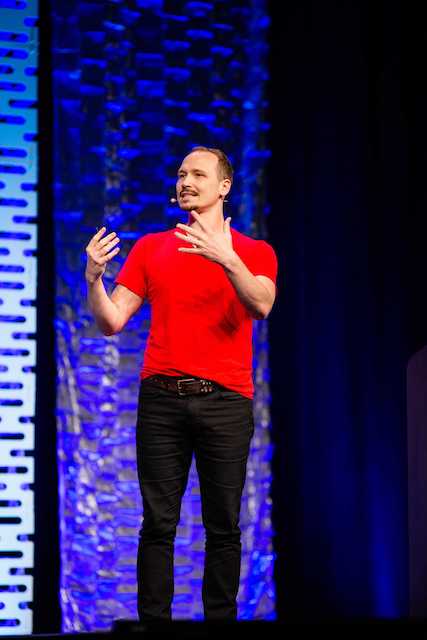
GopherCon UK highlights: An inside look from the host
Editor’s note: GopherCon UK 2021 returned as an in-person conference that took place at the Brewery in London from Oct. 25 to 27. Proof of vaccination or a negative COVID test was required at the door, and all government guidelines were followed.
In this post, I’m going to share my experience of hosting GopherCon UK 2021 and highlight a few talks that I think everybody should watch.
My job as host is to welcome people to the conference, remind them about Go’s community code of conduct, tell them where to find the loos, and, the most fun bit, to introduce the speakers.
For a complete list of speakers and sessions, check out the GopherCon UK playlist on YouTube.

The backstage build up
It is surreal to find myself standing in a conference room in front of a live audience again. I’d been asked a few months earlier to host the GopherCon UK 2021 conference, which was planned to go ahead assuming things with “you-know-what” were on the up.
Backstage is dark. Two or sometimes three audio-video engineers dressed all in black sit behind a good four meters (that’s 13 feet) of equipment. I’m talking about the kind of equipment you’d really hope was powering a big tech conference like this. It’s not just a laptop. They’ve got monitors, cameras, microphones, switches, control panels, mixers, tablets, the works.
Bryan Boreham, our keynote speaker, is being fitted with a Britney headset (which suits him) before the background music fades and the lights gently dim. It’s officially Go time.
Bryan Boreham: Go large!
Grafana Labs’ own Distinguished Engineer Bryan Boreham talked about building and maintaining large systems in this wisdom-packed opener. Bryan’s keynote is, like conversations with him in real life, peppered with gems that you won’t want to miss.
Bryan and I also did a Go Time episode together discussing memory management which I also recommend if podcasts are your sort of thing.
Tiago Mendes: Coordinating data changes in distributed systems
This talk takes the record for the longest Q&A session I’ve ever witnessed at a Go conference.
Tiago’s talk ended early, which was fortuitous given the sheer number of questions he answered in the remaining 25 minutes. Tiago quipped, “Either my talk was so good it inspired them, or it was so lacking that they just had loads of other questions.” The former, Tiago.
We also had Tiago on Go Time discussing a similar theme, eventual consistency, and managing data at scale.
Daniela Petruzalek: Building an indie game in Go
Daniela is brilliant. This is a talk about making a game. What more is there to say? Brilliant speaker, fun project, and a great presentation. Daniela builds games to learn, to sharpen their tech skills, to hone their skill, and what a great way to do that.
You may have seen Daniela writing PacMan in Go from scratch. This time it’s a card game.
Riya Dattani & Chris James: Acceptance tests, BDD, and Go
Riya and Chris are a tag-team act and the dynamic works so well: Chris has been coding for 15 years, and Riya is a new dev, so we get insights and perspectives from both of them throughout their conversation.
Testing is a big subject, and many people will already be familiar with Chris’s free Learn Go with Tests book. This session focuses on how acceptance tests and Behavior-Driven Design (BDD) can help you solidify requirements and have those important conversations as your team iterates.
If you want more, Riya and Chris joined me and David Wickes on the Go Time podcast to talk about TDD.
Eleni Fragkiadaki: Test coverage in Go, the whole package
Sticking with testing, Eleni’s talk about test coverage is thorough and digs deep into the subject in a way that I haven’t seen before. Not just packed with information about how it works, Eleni also discusses how you can use the tools to understand how much of your codebase is executed during testing. Definitely one to watch, especially if you’re new to the subject.
Tom Camp: Creating a basic chat app
I find the best way to learn a new language is to build something real. Not a toy thing, but something you’d actually like to use. This is a great example of a familiar capability that can be implemented in many ways.
Tom takes a publish and subscribe approach and does a great job explaining its benefits over alternatives.
Alex Ellis: Zero to OpenFaas in 60 months
OpenFaaS founder and CNCF ambassador Alex Ellis takes us from the beginning of OpenFaaS all the way through to today. You’ll see how a simple idea starts small and grows over time as more and more people get involved. Alex speaks with a rare openness and honesty, which makes his talk a valuable resource for anybody with aspirations of creating and maintaining a successful open source project.
Conclusion
As the final round of applause draws to an end, I see what looks like a giant “Thank you” slide on the screen. (The slides are reversed when viewed from backstage, and I forgot to bring a mirror again.)
I spring onto the stage and take some time to thank the organizers, the technical staff, the catering company, and everybody who makes the conference happen and run smoothly. I also thank the speakers, of course, without which the conference would be, well, a very unusual experience to say the least.
After two full days of such high-quality talks, it was really difficult to select just a few to mention here. You’ll notice that I have neglected to mention some of the other great presentations. While nothing beats attending a conference in real life, GopherCon UK does publish the entire playlist of talks on YouTube, so you can at least pretend you were there.



